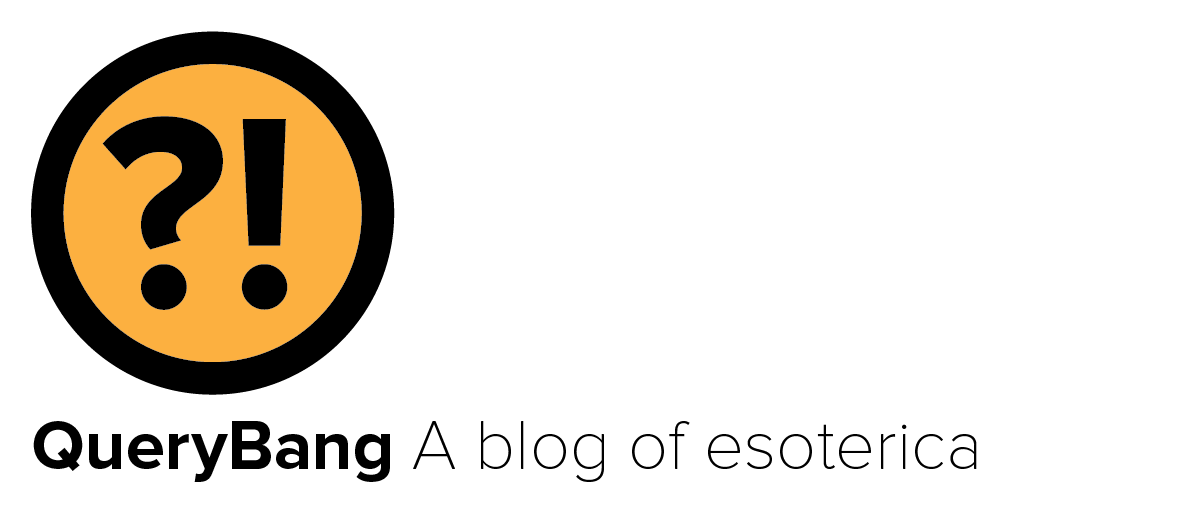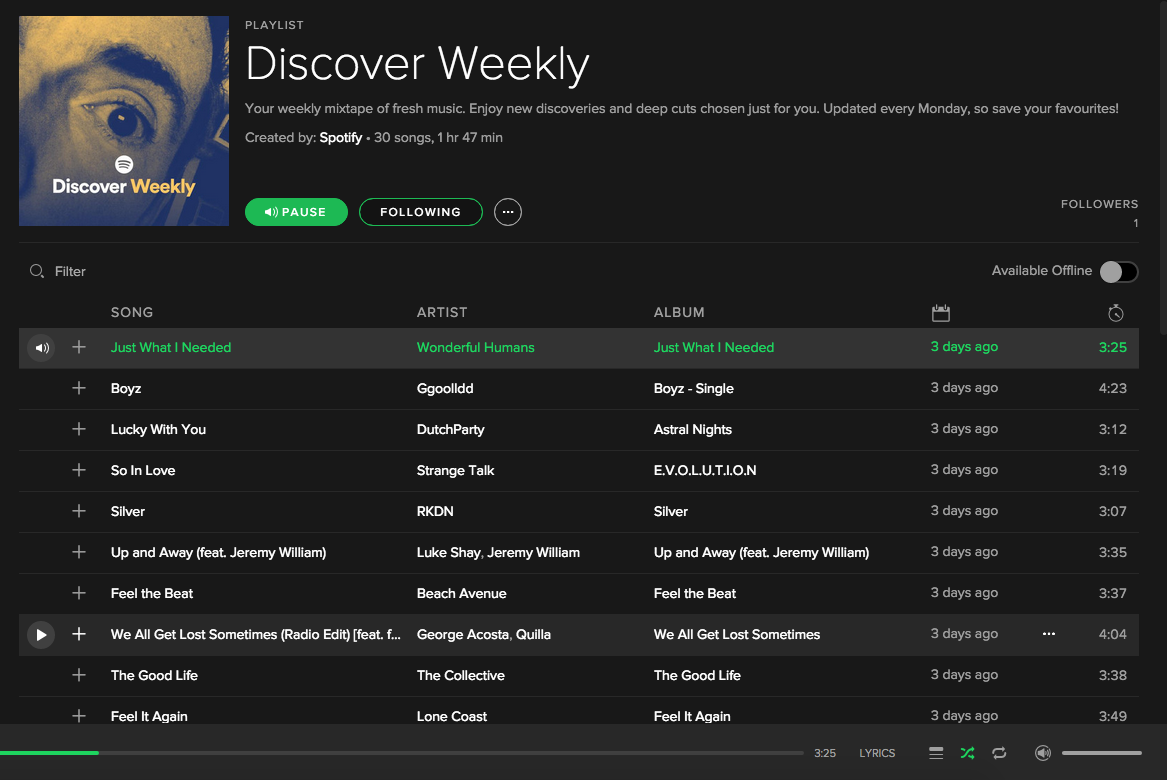Since May 2014, I’ve been dutifully paying for a Spotify subscription*, and quite frankly, it’s some of the best money I spend each month. On a dollar-for-dollar basis, I get more enjoyment and utility out of it than I do from my satellite television subscription. Having access to virtually any music, virtually anywhere, is the sort of musical nirvana that I could only have dreamed of a decade ago.
One of the things that was lacking for so long in Spotify was any meaningful music discovery or recommendation engine. That was resolved (at least partially, anyway) a few months back with the introduction of their Discover Weekly playlists. How does it work?
Discover Weekly takes a stab at addressing what was previously a shortcoming of Spotify: How do you find music you might enjoy, but don’t know you don’t know? Playlist surfing by genre or by using random keyword searches only gets you just so far. Spotify knows what you listen to, how often you listen to it, when you listen to it, what other people who listen to it also listen to, and probably a lot more data points than you would otherwise like them to know. I’ve often wondered why they don’t provide a way to mine these insights, but that’s the idea behind Discover Weekly (at least in theory).
I’m not sure I’ve seen a comprehensive explanation of how Spotify works its Discover Weekly magic, but based on observation the past few months, its algorithms seem to alternate week-to-week between eerily insightful and ridiculously off-the-mark.
Every users’ Discover Weekly playlist is unique to them, updated weekly (of course) and presumably based on music you listen to. It seems clear that what you’ve chosen to add to playlists is factored-in as well. What other secret sauce that’s involved isn’t clear through observation.
The very first Discover Weekly playlist I received was uncanny in its accuracy and applicability. Nearly every single song was something of interest. It suggested 80s tracks I didn’t have in my already massive 80s playlist of 1,000+ songs. It suggested some great indie artists I’d not heard before. There was even an EDM track or two that resonated for me.
Subsequent weeks’ playlists have been hit or miss. Some weeks, most tracks are of interest. Others, I can barely find two decent tracks out of the 30 that compose each weeks’ list.
It also seems clear that the logic used needs… Well, a little work.
I build my own playlists from a range of sources, and one of them is listening to Spotify’s own weekly new music playlists. Those playlists drawn primarily from pop, but rock, EDM, country and other genres are also represented in smaller numbers. Unbeknownst to me, a contemporary Christian music track made its way onto one of my playlists a couple months back. I’m neither Christian, nor a fan of Christian music, but a good song is a good song. Suddenly, however, contemporary Christian songs started appearing in my Discovery Weekly playlists on a regular basis, most of which had decidedly faith-steeped themes that were, to put it nicely, not my cup of tea.
The point here is that making broad assumptions of interest based on genre alone is not a very accurate or “safe” basis for recommendations. I like the occasional rap song too, and even some country crossover. But I have precisely zero interest in listening to either genre for more than a few minutes per month—tops.
The other challenge I’ve seen in Spotify’s algorithms is that they tend to suggest songs from artists I have in existing playlists. Broadly, that’s fine, but the issue is the same as with genres: Just because I like one song, doesn’t mean that I can, will, should, or am likely to like songs from the same album, the same artist, the same genre, the same time period, or any other attribute of any given song.
Articles I’ve read (here and here) suggest that Spotify uses a combination of algorithms and human curation, broadly speaking. The latter article suggests that Spotify has somehow mastered scaling human curation to Internet levels. Flatly, I disagree. The former article suggests that internally, Spotify has created a lot of song metadata that sounds similar to Pandora’s genomes in terms of quantifying the attributes of individual songs. But it seems abundantly clear that Spotify has done this on only a subset of the total music library. If that were not the case, I think that:
- I would see a much broader variety of songs being suggested, rather than a lot of repetition involving the same artists (who have clearly been subject to closer review for whatever reason). On close examination of my Discover Weekly playlists, I can see common trends and threads that reveal that Spotify staff members clearly have their favorite artists. It’s a long list, perhaps, but it’s glaringly obvious that there is one.
- There would be a lot fewer wildly wrong suggestions. I don’t know what all metadata Spotify tries to apply to individual tracks; one of the above-mentioned articles gives some examples. But it seems abundantly clear that it’s either badly done, or nowhere near as broad or deep as it needs to be. Stylistically, some of the suggestions the system comes-up with are nothing short of bizarre, and so divergent from my tastes as to be, basically, completely random.
Given that Pandora’s ostensibly superior music analysis approach yields similarly weird results, and given the enormous range and volume of music in the world, it’s hardly surprising that music recommendation continues to be a tough nut to crack well.
Even if Spotify had perfect metadata, just because I like one song that is acoustic guitar forward, has a female vocal, has lyrics about lost love, has a tempo of about 85 BPM, and uses conventional AABA song form… Doesn’t mean I want to hear that formula again and again, any more than I need Amazon showing me their amazing selection of ceiling fans because I once bought from them the only ceiling fan I’ll likely ever buy.
What seems to be missing with Spotify is true “big data” analysis, as I alluded to earlier. With all the information about who listens to what (“people who listen to this, also listen to that”), you’d think that even with no human interaction at all, the data could and would uncover some pretty relevant recommendations. I mean, if 1,000 other people listen to even 2/3 of the same music I do, find some common threads among the other 1/3 where there are gaps against my own listening habits, and suggest those. It hardly seems impossible, and it’s the sort of analysis I’d like from both Amazon and Spotify—but don’t get.
Spotify clearly has some of the pieces right. Here’s hoping that they can figure-out the rest of them, and return results that make sense, on a more consistent basis. To me, that’d be a differentiator that would ensure their place as the #1 music streaming service. (And if Spotify doesn’t do it, then Apple Music or one of the others might become dominant if they do it first.)
In the meantime, music discovery still feels mostly self-directed, far more than it should.
* Note that In early 2022, during the infamous Joe Rogan podcast misinformation fiasco, I canceled my Spotify subscription, and instead opted to use Apple Music. I used an app to migrate my playlists, and never looked back. In a future article, I’ll talk about how Apple Music is doing discovery — and how much better it is than Spotify’s effort.

